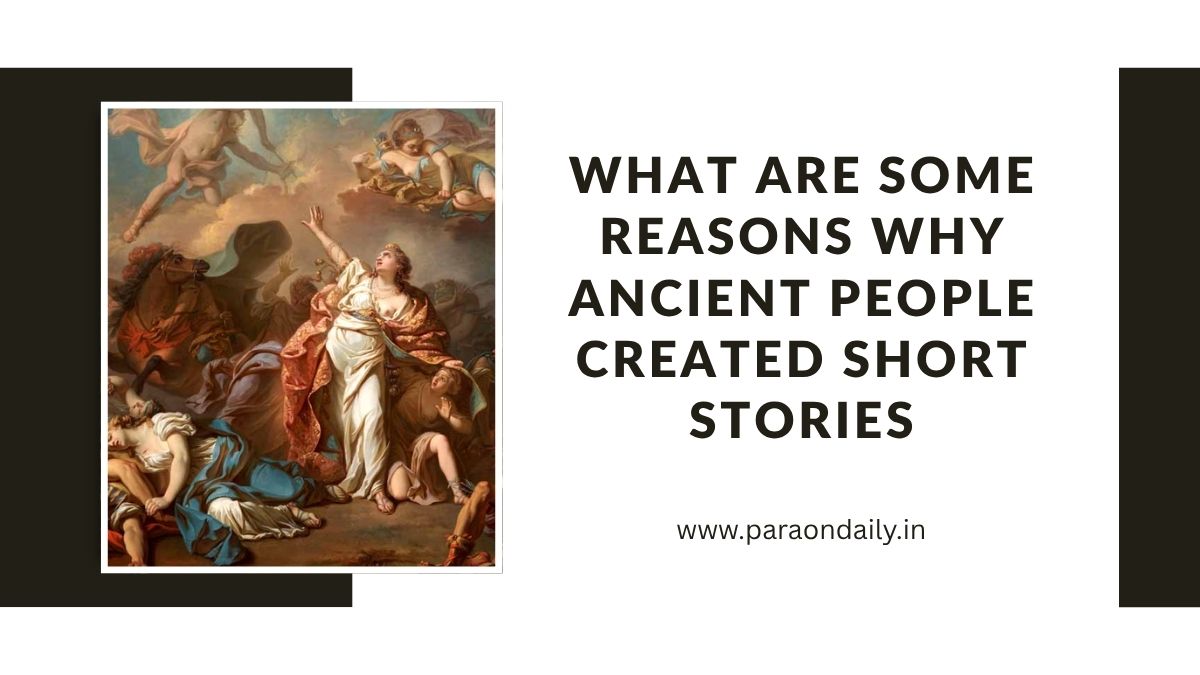Stories have always played an important role in human history. Long before books, printing, or digital media existed, people shared stories by speaking and listening. One may ask, what are some reasons why ancient people created short stories? The answer lies in the way ancient people lived, communicated, and passed down knowledge. Short stories were easy to remember, fun to share, and filled with lessons. They helped ancient communities teach values, entertain others, and preserve culture. These stories were often passed from one generation to the next through word of mouth.
In this blog, we will explain in very easy language what are some reasons why ancient people created short stories and why they are still important today.
What Are Some Reasons Why Ancient People Created Short Stories
1. To Teach Moral Lessons
One of the main reasons ancient people created short stories was to teach morals and values. In times when formal education did not exist, stories became a tool for learning. Through characters and events, people could understand right from wrong, good from bad.
For example, in ancient fables or folk tales, animals often spoke and behaved like humans. These stories taught children and adults about honesty, kindness, hard work, and respect. The simple structure of a short story made these lessons easy to remember and share.
2. To Pass Down Traditions and Culture
Another strong reason was to keep culture alive. Ancient communities had rich customs, beliefs, and rituals. But without writing, it was hard to preserve these. So, they created short stories to pass down their way of life.
Through stories, they taught the younger generation about their gods, festivals, farming methods, clothing styles, and social roles. For example, many Indian and African tribes used stories to explain how the world began or how certain animals came to be. These stories helped people stay connected to their roots.
Also read: What is the Main Benefit of Organizing Data into a Table in Excel?
3. To Share History and Important Events
Before history books were written, short stories helped people remember and retell historical events. Kings, battles, natural disasters, and heroic deeds were all shared through storytelling.
For example, the story of a brave warrior protecting his village might have been told for generations. Over time, the story may change a little, but the main event remains. This way, ancient people preserved their history and made sure important memories were not forgotten.
4. To Entertain the Community
Entertainment was also a big reason for creating short stories. Life in ancient times was hard, and people worked long hours. In the evenings or during festivals, storytelling was a popular form of fun.
People would gather around fires, listen to elders, and enjoy tales full of adventure, love, magic, and mystery. These stories helped people relax, laugh, and forget their worries. For many, stories were as enjoyable as music or dance.
5. To Explain Natural Phenomena
Ancient people were curious about the world around them. They saw the sun, moon, stars, rain, and thunder but did not have science to explain these things. So, they used stories to make sense of nature.
For example, they might say the sun is a golden chariot driven by a god. Or that lightning is the weapon of an angry sky spirit. These stories were not scientific, but they helped people understand their world in a way that made sense to them.
This method of storytelling made learning about the world fun and imaginative.
6. To Inspire and Motivate
In ancient times, short stories also served as a source of inspiration. People often told stories of heroes who faced danger, showed courage, and achieved success against all odds.
These stories motivated others to be brave, work hard, and believe in themselves. They were especially useful during difficult times like war, drought, or famine. Listening to stories of hope gave people strength and confidence.
For example, a story of a poor man becoming rich through hard work taught others that success is possible with effort and patience.
7. To Build Social Bonds
Storytelling helped bring people together. In ancient villages or tribes, people had strong social ties. Sitting together and sharing stories helped strengthen those bonds.
Elders shared stories with children. Neighbors told stories to each other. These simple acts of sharing made people feel closer, safer, and more connected. Storytelling also helped in resolving conflicts, teaching forgiveness, and creating unity within the group.
In this way, short stories helped shape not just individuals but entire communities.
8. To Teach Language and Communication Skills
Another important reason was language learning. Since children in ancient times didn’t go to formal schools, they learned to speak and understand their language through stories.
Stories helped in:
- Learning new words
- Understanding grammar
- Practicing speaking and listening
Parents, teachers, and elders used stories to help children grow their communication skills. Short stories were easy to follow and remember, which made learning more effective.
9. To Spark Creativity and Imagination
Ancient people used stories to spark the imagination of young minds. A short story about a magical tree, a flying animal, or a talking river would inspire children to dream and think creatively.
Even though many of these stories were not real, they helped develop creativity. This was useful not only in art and music but also in solving everyday problems. Creative thinking helped people invent tools, build homes, and grow crops better.
Stories made people believe that anything was possible, even in difficult times.
10. To Preserve Local Languages and Dialects
In many ancient societies, people spoke in local dialects or languages that were not written down. Short stories helped preserve these languages.
When stories were shared from one generation to another, the language was passed on too. This helped protect the unique identity of each tribe or community. Even today, many ancient stories are used to save endangered languages.
So, short stories helped keep not only culture but also language alive.
11. To Educate Without Books
Books were rare or nonexistent in ancient times. Education had to happen in a different way. Short stories became a great tool for teaching everything from behavior to survival.
For example:
- A story might teach how to find water in the desert
- Another story might warn against trusting strangers
- A tale could explain how to respect animals and nature
These small stories carried big lessons that helped people live better lives.
12. To Pass Time During Travel or Work
Travel in ancient times was slow, and people often walked long distances. To pass the time, they told and listened to stories. Similarly, while working in fields or forests, storytelling kept people entertained and alert.
This made tiring work feel lighter and kept the mind active. Stories were a natural part of daily life in ancient times.
13. To Preserve Religious Beliefs and Spiritual Values
Many short stories were connected to religion and faith. They talked about gods, goddesses, spirits, and life after death. These stories helped explain religious beliefs in a way that was easy to understand.
For example, myths from Greek, Hindu, or Egyptian cultures taught people how to live good lives according to their faith. Short stories were the easiest way to pass on these complex ideas.
Also read: Why Did William Jones Feel the Need to Study Indian History Philosophy and Law?
Conclusion
So, what are some reasons why ancient people created short stories? The reasons are many, and each one is important. From teaching morals and preserving culture to entertaining communities and explaining nature, short stories were a powerful tool for ancient people. They helped in education, communication, emotional bonding, and even survival. These stories connected generations and kept traditions alive.
Even today, many of these stories are retold in books, movies, and classrooms. They remind us that storytelling is not just about fun—it’s also about wisdom. That’s why short stories, though simple, hold a special place in history and in our hearts. They are timeless treasures passed from one age to the next.

